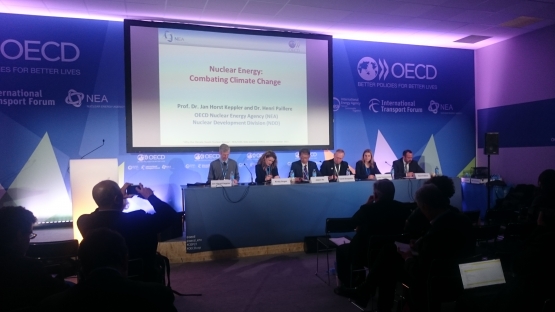In weighing the energy options for mitigating climate change, nuclear energy should be considered on equal footing with other low-carbon energy sources for its broader potential for contributions to sustainable development, said IAEA Energy Economist Loreta Stankeviciute at the Paris climate conference on Thursday.
“Nuclear energy compares favourably across many sustainability indicators,” stated Stankeviciute, presenting at the COP21 side event entitled Why the Climate Needs Nuclear Energy, co-hosted by the IAEA and the Organisation for Economic Co-operation and Development (OECD) Nuclear Energy Agency (NEA). Nuclear power has a low impact on human health and the environment, as compared to other sources of electricity, especially fossil fuels.
Future nuclear technologies can further reduce the volume and radioactivity of high level radioactive waste. However, nuclear energy does require a significant amount of water for cooling, but higher efficiencies in advanced technologies can reduce these needs in the future, Stankeviciute added.
“Nuclear energy also contributes to sustainable development in a societal context,” said Stankeviciute. “It creates economic growth and new jobs. Skilled labour is necessary to design and operate nuclear power plants.” The IAEA is currently working on a detailed report on the nexus between nuclear power and sustainable development.
This echoes the statement by IAEA Deputy Director General Mikhail Chudakov earlier this week to consider nuclear energy as sustainable energy because it has low life-cycle greenhouse gas emissions and has the potential, with innovative technologies, to serve humanity and bolster development effectively for a very long time.
“By addressing key Sustainable Development Goals, nuclear energy has potential macro-economic benefits,” said David Shropshire, Head of the Planning and Economic Studies Section of the IAEA, at the side event. “The IAEA is looking at developing tools, training courses and expert and review missions to help Member States analyze these macro-economic benefits.” A joint publication of the NEA and IAEA, Guidance Document for Measuring Employment Generated by the Nuclear Power Sector, will be published in early 2016.
Taking place from 30 November to 11 December 2015 in Paris, France, the 21st Conference of Parties (COP21) to the UN Framework Convention on Climate Change (UNFCCC) provides countries the opportunity to present their climate change strategies and reach a legally binding agreement on climate change. The IAEA has had an exhibit in the One UN Exhibit Area and will co-host this side event again on Why the Climate Needs Nuclear Energy on Friday, 11 December 2015, at 11:15-12:45 at the OECD Workspace, Blue Zone, Hall 3, Plot 7.
For more information on how nuclear energy can address climate change, see the recently published IAEA report on Climate Change and Nuclear Power.
“By addressing key Sustainable Development Goals, nuclear energy has potential macro-economic benefits. The IAEA is looking at developing tools, training courses and expert and review missions to help Member States analyze these macro-economic benefits.”






